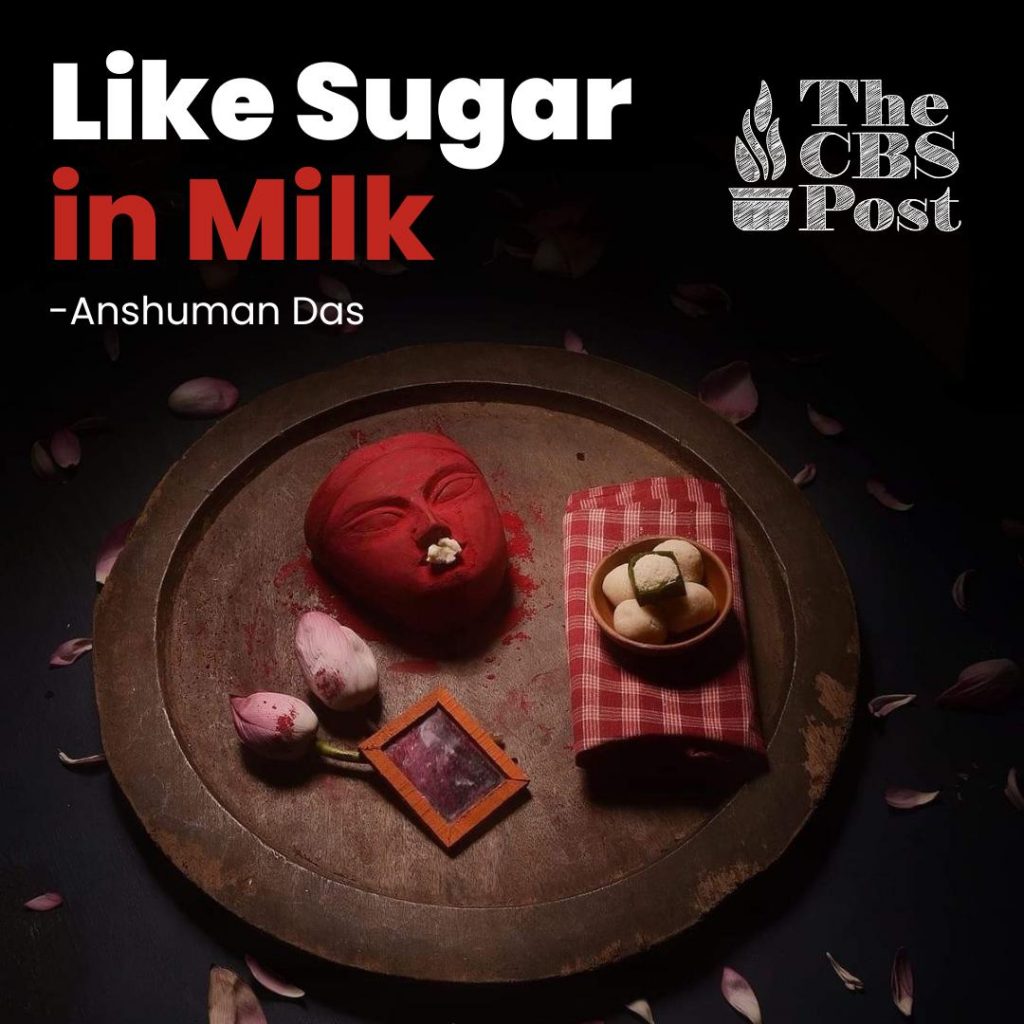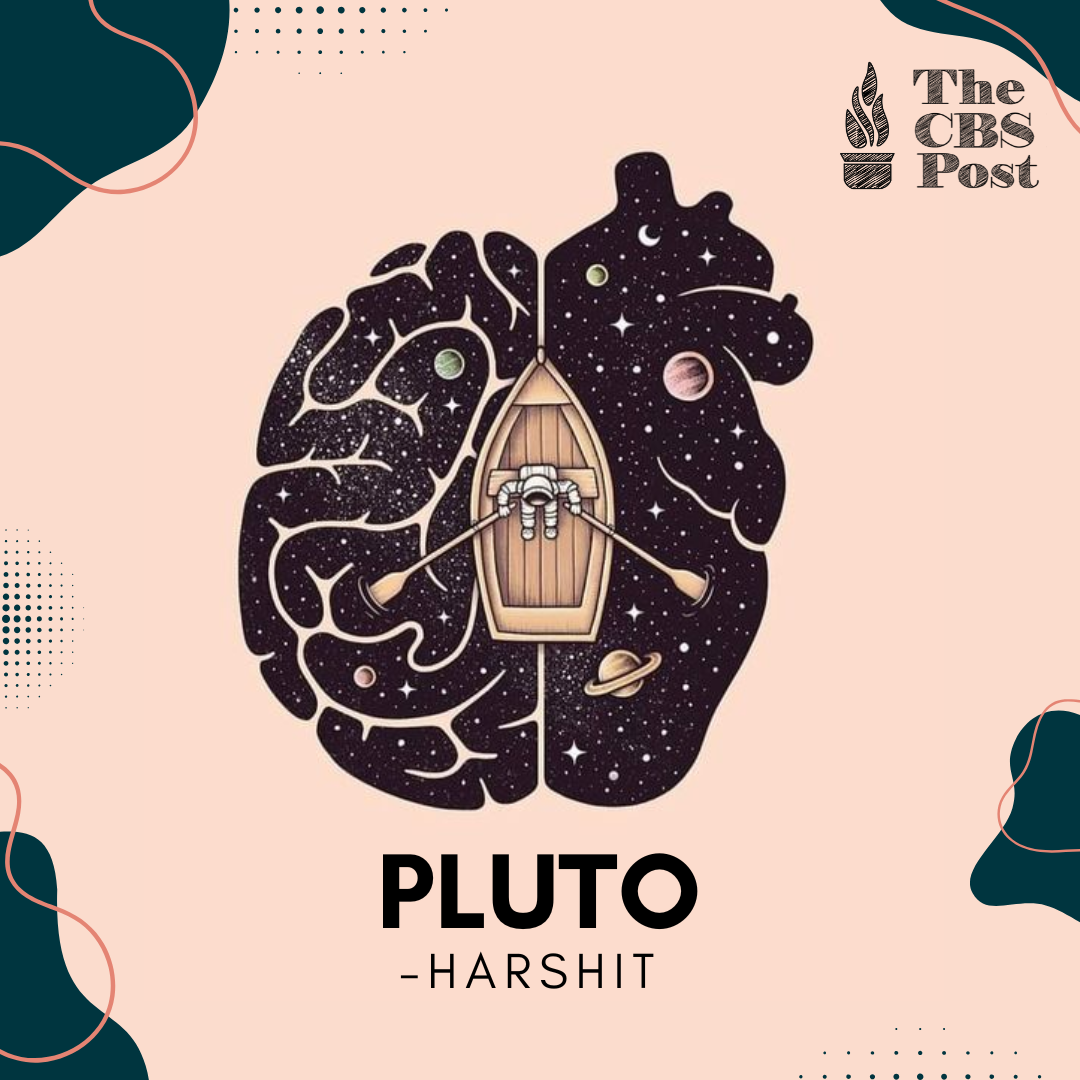Like Sugar in Milk
By Anshuman Das (BFIA’25)
On the full moon night following Bijoya (Dussehra), it dictates as a norm for Bengalis to worship Goddess Lakshmi and ask her for “Doodhe bhaate beche thake tomar sontan”(May your children sustain on Milk and Rice). All praises to the splendid internet and connectivity boom in India in the gone decade, we would even start asking her for “Paneer-Roti te beche thake tomar sontan”. Being a geographical identity where agriculture rules as the 8th commandment of Noah, Bengal reveres goddess Lakshmi more as a personification of the affluence of grains, overshadowing the colloquial economics aspect of hers dominant in the rest of the country.
But wait! Pause! Pause! Pause!
As per an exclusive press statement by the Goddess’ Mount, the endearing Owl, the rise of veganism and animal compassion movements in urban dwellings has led her children to ask for Tofu and rotis, since devouring gross animal liquids would bar them from gazing at the damsels in Indra’s heaven. Gone are the days when academicians would tower over heaps of studies on how vegetarianism in India is the brainchild of ideologies of “One nation, one religion, one language” and caste seclusion more than solicitude, it’s time to level up our tenderness by accepting veganism.
To my observation, as youngsters thriving amidst the shining glass panes of metropolises, I believe that our notion of discrimination in urban spaces is very skewed since our books impose the fact that caste hierarchy was uprooted over 74 years ago. We tend to un-fathom or even reason why parents are advised not to pack eggs or chicken sandwiches for their children studying in reputed ‘urban’ schools or why do we consider some foods ‘gross’. To define gross food, it is anything edible that uproars an emotion of disgust among us; historically enough, we observe that this definition of gross food has been the cause of the extinction of many recipes, like the Eeda Paak (Egg Paak) of Parsi cuisine, Mutanjan of Mughal Delhi or Shutki Bhorta (dried fish chutney) of east Bengal. To the eyes of a metropolitan Indian, this phenomenon may seem as a course of the ever-transient history. Still, it is equally a loss of many annals of history among common memory. For example, Mutanjan, a sweet pulao cooked with Chicken, preserved fruits and milk, was prepared during weddings in the later Mughal-era Delhi and sent to the groom’s residence by the hands of the bride.
Speaking of Parsis, an elephantine grievance I have with them pertains to the celebrated story of the persecuted Zoroastrians of Iran, gallivanting through sea and land routes in Asia, who took refuge under the king ‘Jadi Rana’ of Gujarat and promised that they would be the ‘Sugar in milk’, who would not let the milk overflow and make it sweeter. A modern-day Indian would also mold the notion of diversities in India into the same story, with heterogeneity as a flavoring agent in society and not an identity in itself. The Conception of ‘pure’ dietary preferences, widespread as wild as a forest fire in ultra-modern India has not only led to the decay of historical meat-inclining cuisines, but also vegetarian cuisine itself; the Paneer-Roti syndrome for example. Our prevalent perceptions of vegetarian cuisine would be anything with paneer, which stimulates those notorious jokes of red gravy paneer versus red gravy Chicken. A sociological perspective to this would again be our obsession with food as a yardstick of ritual purity and not a personal choice; i.e, we choose to prefer vegetarian cuisine not as an ode to this culinary affluence but to be the socially acceptable ‘ideal one’. Hence to no surprise the tag of ‘usual’ vegetarian has been fortuitously bestowed upon Paneer for ages. Not to mention, this accidental popularity of Paneer has also led to the loss of many Indigenous versions of cheese like Churpi from the Nepal-Bhutan frontiers, Kalari from Kashmir and Churu from Sikkim.
Henceforth, why does the ‘prevalent India’ take pride of its individuality amongst the global diaspora if it imposes the conformist edict of collective identity upon the rest? Perhaps, we need to realize that diversity is not a flavoring agent like sugar in milk without an individuality of its own, but rather a flower that makes the garden vibrant.




Comments